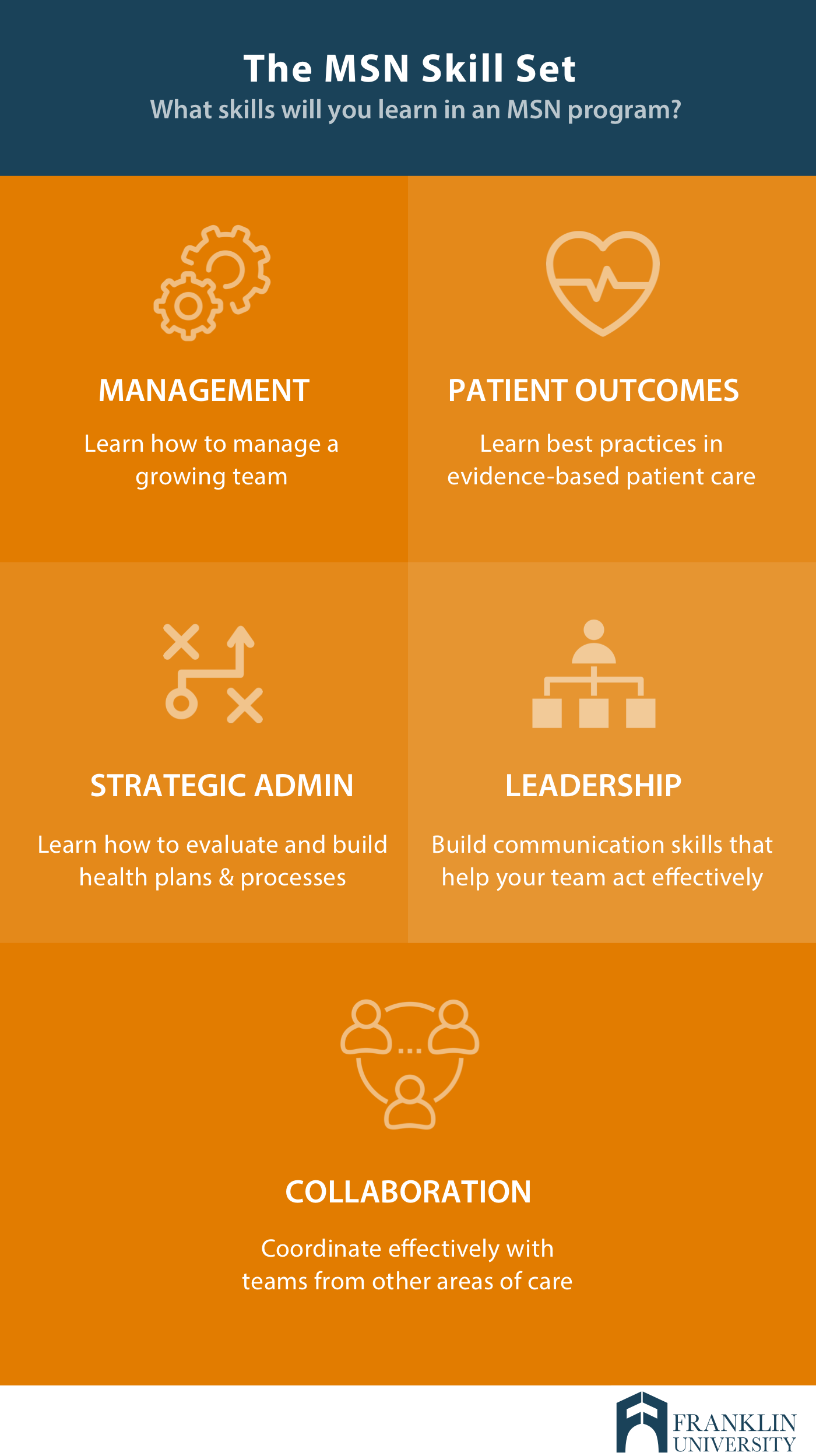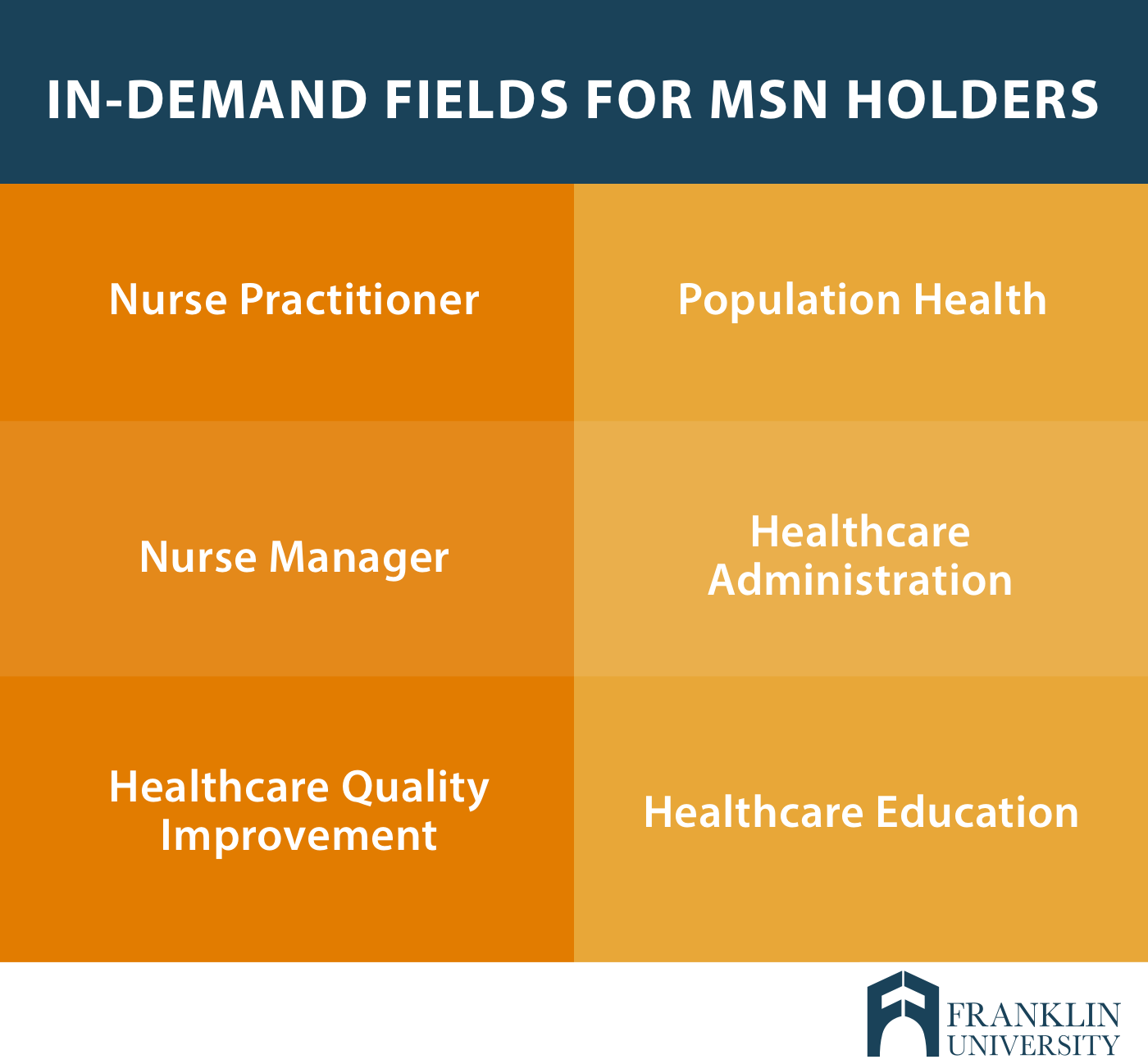Request Information
We're Sorry
There was an unexpected error with the form (your web browser was unable to retrieve some required data from our servers). This kind of error may occur if you have temporarily lost your internet connection. If you're able to verify that your internet connection is stable and the error persists, the Franklin University Help Desk is available to assist you at helpdesk@franklin.edu, 614.947.6682 (local), or 1.866.435.7006 (toll free).
Just a moment while we process your submission.

Master's in Nursing Jobs: What Areas Can You Focus On?
Nurses are achieving new levels of demand in the rapidly growing field of healthcare.
Healthcare practice and policy is constantly changing, as is the education required to manage it all. To expand your knowledge and skills in nursing, a master’s of science degree in nursing (MSN) can be a key catalyst for your career growth.
There are dozens of employment paths to consider with an MSN degree. Some high-growth and in-demand positions include the following list of 6 power careers.
1. Nurse Practitioner (Advanced Practice Registered Nurse)
Nurse Practitioners (NPs) are also known as Advanced Practice Registered Nurses (APRNs). Their role in healthcare borders on many of the common elements often performed by physicians.
It’s an important job that is performed in a wide variety of healthcare settings, including hospitals, physicians' offices, and clinics.
Employment of NPs is projected to grow 31% from 2016 to 2026, much faster than the average for all occupations. Growth will occur primarily because of an increased emphasis on preventive care and demand for healthcare services from an aging population. According to the Bureau of Labor Statistics, the 2017 mean annual wage for NPs was $107,480.
To be a nurse practitioner, you must earn at least a master’s degree with an NP designation. You must also be licensed in your state and pass a national certification exam.
Get a FREE guide to help you advance your career, featuring helpful advice and thoughtful insights from nursing experts.
2. Population Health / Gerontology
Population health is about understanding conditions and factors that affect the health of any population, identifying patterns, and applying the resulting knowledge to improve the health and well-being of those populations. It may be a population based on income, geography, age, or medical need. For example, low birth-weight babies can be considered a population that can be helped via population health research, insights, and policy. These days, “population health” and “gerontology” are sometimes discussed together because one of our largest identifiable U.S. populations (the Baby Boomers) are beginning to move from senior status into elderly status. The healthcare concerns of an elderly population include increased risks, costs, and resource usage. With these increased needs comes the demand for MSN-trained nurses to understand, guide, and drive population health policy.
If you love research and are the kind of person who wants to make a real difference in your community, this could be a smart and satisfying career move for you.
3. Nurse Manager/Director
Nurse Managers supervise the nurses who provide direct patient care. They typically hire, train, and oversee nursing staff, but they also are called on to collaborate with doctors on patient care. They also may occasionally assist or advise patients. Managing records is also a part of their job, including medical records for patients and employment records for nurses who report to them.
Beyond having skills in nursing and healthcare, a nursing manager or director must also deftly handle administrative tasks, like creating work schedules, managing budget decisions, and dealing with employment matters like promotions, reviews, and discipline.
According to PayScale.com, nursing managers make, on average, about 30% more than a registered nurse who is on rotation (with a median annual pay of $82,829 as compared to $62,304).
4. Healthcare Administration
Administrative roles for a person with an MSN are plentiful and varied.
As one example, a hospital or medical facility now commonly has a role of patient safety director. In this position, the director ensures patient care meets proper standards. They may also manage their facility’s patient safety program and guide the entire workforce to focus on safety as a top priority. In this role, a person typically explores research and watches for data trends on safety problems. They need to understand safety challenges as they arise so they can address them quickly--perhaps even before they become an issue at their facility.
It’s a solid career choice. The Bureau of Labor Statistics suggests that opportunities for medical service managers and administrators will grow by 23% in the next decade.
5. Healthcare Quality Improvement
Healthcare quality improvement positions are of increasing importance in healthcare facilities.
With healthcare provider shortages looming in the future, facilities want to protect themselves by adding the insight of people dedicated to maintaining top care standards and policies while also fighting against lapses in quality. Job titles for MSN degree holders might include Director of Quality Initiatives, Quality Initiatives Manager, Quality Improvement Director, Clinical Quality Analytics Manager, or Director of Analytics.
The focus is on safety and an area of study called “informatics,” which means using medical data for informed decision-making, motivated by efforts to improve health and outcomes.
6. Healthcare Education
Health educators teach people about behaviors that promote wellness.
At the higher levels of employment, they may be responsible for developing and introducing strategies to improve the health of individuals and communities. They work in a wide variety of settings, including hospitals, nonprofit organizations, government, doctors’ offices, private businesses, and colleges.
MSN-trained nurse educators will likely have many career options available to them in the coming years. The anticipated growth in health education is 16% over a 10-year period.
Bonus: 5 Marketable Skills You’ll Build with an MSN
Not quite sure the direction you want to take in healthcare? That's okay. An MSN can lead you into a variety of careers by giving you marketable skills.

Thinking About an MSN? Here’s What You Need to Succeed.
MSN degrees attract people with a multitude of unique goals and career paths. According to Dr. Conner, the type of person who will do well in an MSN degree program can be described as:
- Able to make a major time commitment
- Seeking to understand nursing in a broader and deeper way
- Willing to dig into literature and determine what is the best evidence for making changes in practice
- Able to write exceptionally well (or willing to perfect writing skills)
- Interested in helping people and communities
- Able to communicate with other healthcare professionals in ways that will allow their expertise to be recognized
- Wanting to make a difference in the future of healthcare
If you’re anxious to learn more about what an MSN can do for you, what it takes to earn it, and what specialties are available, see this article with details about the MSN degree.






